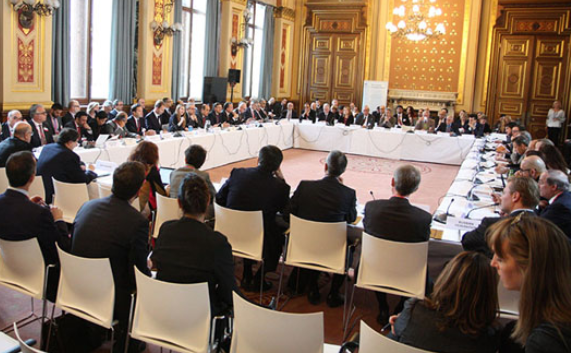Representatives of 40 countries, UN Agencies, and international bodies, as well as a number of independent Libyan experts, met in London on 19 October at a meeting co-hosted by the UK and UN Support Mission in Libya (UNSMIL) to agree the most effective way to support a new Libyan Government of National Accord (GNA).
Opening the meeting, UK Minister for the Middle East and North Africa, Tobias Ellwood, pressed for the swift formation of the Libyan Government, and offered assistance.
“The presence of so many countries and agencies here today, and the seniority of their representation, reflects the depth and breadth of the international commitment to help the new Libyan Government,” Mr. Ellwood said.
“As the Foreign Secretary said yesterday in a letter with his international colleagues, the parties to the dialogue face a stark choice. If they delay approval of the text and annexes, they will put at risk the stability of the country. To secure Libya’s future, we urge the Libyan parties to immediately approve the hard fought political compromise set forth in the political agreement, so that Libya can begin the task of rebuilding effective institutions in the country, and provide the security and services which the Libyan people want and need.”
He added: “We stand ready to offer Libya significant programmes of assistance as soon as our help is requested, and we confirm that our commitment to Libya is strong, and for the long term.”
Deputy Special Representative of the Secretary-General for Libya, Mr. Ali Al-Za’tari, reiterated UN calls on the Libyan parties to endorse the Agreement, which he described as a “win-win” for Libya. “There is no other way except, God forbids, a further slide into bloodshed and chaos,” he warned.
Mr. Al-Za’tari said that the meeting will discuss how best to help the Government of National Accord through the proposed Aid Coordination structure and from the experience of implementation in countries in similarly challenging conditions.
“We look to past lessons as we plan for the future, trying to avoid mistakes and ensure maximum coordination within the international community - but most importantly with Libyan ownership and a Libyan lead role,” he said.
Mr. Al-Za’tari said the United Nations has already set in motion plans to provide direct expertise, adding that while Libya has the necessary resources its capacities remain weak. “Libya of today and the next few months will no doubt require plenty of your assistance, in funding and expertise,” the DSRG said.
(Source: UNSMIL)





